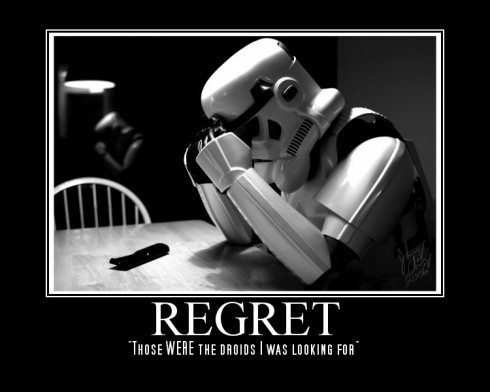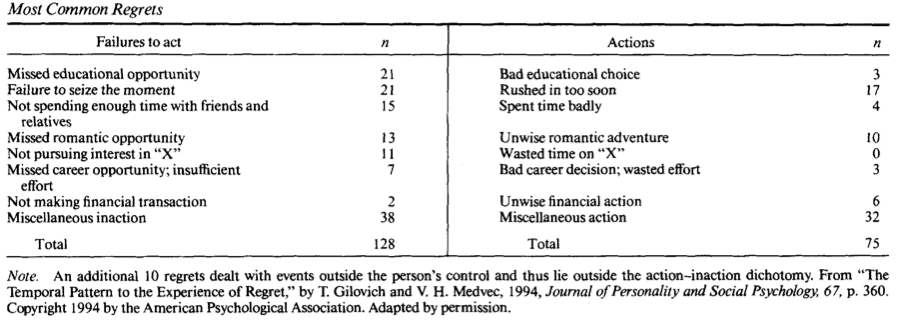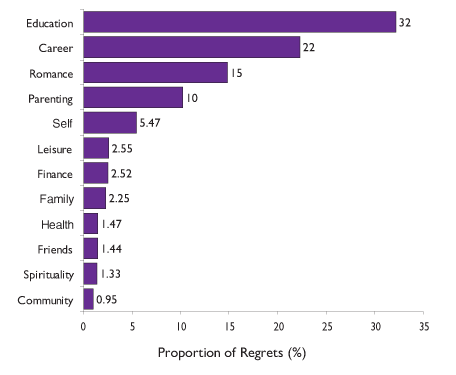How To Overcome Regret And Seize The Day — Scientifically
.
What hurts more than those pangs of regret? It’s one of the worst feelings in the world, right?
But I’ve got a surprise for you — regret can be a good thing. In fact, sometimes you enjoy it. Sound crazy?
When researchers asked people to score the upside of many different emotions, regret actually beat out pride.
Via Mastering the Art of Quitting: Why It Matters in Life, Love, and Work:
Both regret and disappointment, however, scored much more favorably than anger, guilt, or sadness, surpassing even pride, a positive emotion— showing that individuals do see a value in regret.
Why? Even though it’s very unpleasant, we see value in regret. We can learn from it.
But can’t we learn without the godawful nagging pain? That’s the real question. And the answer is we can.
But we need to understand how regret works before we can beat it. Let’s get some answers.
What Do We Regret The Most?
Regrets about education, career, romance, and parenting top the list.
Via Mastering the Art of Quitting: Why It Matters in Life, Love, and Work:
The six biggest regrets fell into the following domains, in descending order: education, career, romance, parenting, self-improvement, and leisure. (If you’re curious, the next six were finance, family, health, friends, spirituality, and community.) It’s a bit surprising that education was the number one regret, but the authors argue this point: “Opportunity breeds regret. Feelings of dissatisfaction and disappointment are strongest where the chances for corrective reaction are clearest.”
Not too surprising, but what can we really learn here? What do these things have in common that causes that terrible gnawing?
The research shows we consistently regret missed opportunity.
Education, career, relationships… our errors in these domains loom so large because of all the possibilities that might have changed our lives.
A second thing the research confirms is that the old saw is true: you’re more likely to regret the things you didn’t do.
Indeed, in the long run, people of every age and in every walk of life seem to regret not having done things much more than they regret things they did, which is why the most popular regrets include not going to college, not grasping profitable business opportunities, and not spending enough time with family and friends.
And it’s amazing how consistently these two principles prove out.
Of the top five most common career regrets, four are due to inaction and all five are related to missed opportunity.
Why we regret missed opportunities is pretty obvious. We love having options and hate when they go away.
But why are the things we don’t do so much more painful over time than the things that we actually follow through with?
There’s a reason…
You Have A Psychological Immune System
Your brain doesn’t want you overwhelmed with regret 24/7. So it conspires to help you. What does it do?
It rationalizes. We humans are rationalizing machines.
So when you do something stupid, you feel bad but part of your brain immediately starts digging for silver livings:
- I should have left that terrible job sooner… but staying there I really learned a lot about myself.
- The marriage didn’t work out… but otherwise I wouldn’t have had these beautiful kids.
We all do it and it helps us get by. But what happens when you don’t do something stupid? When you don’t do anything at all?
It’s hard to learn from experience when there is no experience. It’s harder to generate silver linings for things you never did.
Harvard happiness expert Dan Gilbert explains:
But why do people regret inactions more than actions? One reason is that the psychological immune system has a more difficult time manufacturing positive and credible views of inactions than of actions… when our inaction causes us to reject a marriage proposal from someone who later becomes a movie star, we can’t console ourselves by thinking of all the things we learned from the experience because… well, there wasn’t one.
And later on in life it’s often harder to remember why we didn’t do things than why we did do them.
Often we were just scared. But years later that irrational fear fades and we kick ourselves for not taking risks.
Via Mastering the Art of Quitting: Why It Matters in Life, Love, and Work:
For one thing, regrettable inactions are much harder to reframe because, in retrospect, it usually seems eminently clear that the reasons you had for not doing whatever it was…don’t seem to hold water over time…
So most regrettable things we follow through with will be rationalized away by our helpful brains.
But when we have failed to act, how do we deal with that ache just won’t go away?
How To Overcome Regret
The research says you should ask yourself two questions.
1) Ask yourself, “What can I learn from this?”
Regret has a purpose. It’s like the oil light on the dashboard of your life, telling you something needs to be fixed.
Studies back this up — regret is more intense when it’s something that we can do something about.
Researchers call regret an “upward counterfactual.” That’s a fancy term meaning we’re comparing the way things are against a better alternative.
And, in moderation, this is a good thing.
Via Mastering the Art of Quitting: Why It Matters in Life, Love, and Work:
Counterfactual thinking opens the door to modifying future behavior by focusing on a revision of the past.
Contrast what happened with what you wanted and formulate a lesson about how to do things differently next time.
2) Ask yourself, “How could it have been worse?”
An “upward counterfactual” is great for learning but over time it’s what creates that nagging ache of regret.
How do we kill the pain now that we’ve learned our lesson?
This is where we need what researchers call a “downward counterfactual.” Ask “How could things have been worse?”
Research shows this kills the negative feelings associated with regret. Turn disappointment into gratitude.
Take “I can’t believe I crashed my car. I’m so stupid.” and turn it into “I’m so lucky I didn’t die in the accident. How wonderful!”
The combination of these questions is a great one-two punch:
- We all know people who immediately ask the second without the first. They feel better but don’t learn a thing and repeat their mistakes.
- And we’re all guilty of merely asking the first question without the second — just beating yourself up over what you should have done.
That said, an ounce of prevention is worth a pound of cure — how can we stop making new regrets?
And the answer to this can actually be a lot of fun.
How To Avoid Regret In The Future
We’ve learned a bunch of stuff:
- Our brains rationalize most of the things we do wrong.
- Regret over the things we follow through with is rarely as bad as we anticipate and we get over it faster than we think.
- But we can feel terrible pain for years over things that we don’t do.
Check out the chart below by researcher Thomas Gilovich.
The pain over inaction is more common in nearly every category compared to failures of action:

And what happens when you ask the older generation what their life experience has told them about regret? They consistently respond:
Say “yes” to opportunity.
What’s all this add up to? Nike has it right, folks. The answer is often:
JUST DO IT
If it’s not going to get you killed, arrested, maimed or divorced, consider doing that thing. Be a little more bold.
Your future self will thank you… or just rationalize it away.
What else do older folks regret most? So much time wasted on pointless worrying.
Spend less time on your fears and more time thinking about what it is you do want to do in your life.
Candy Chang explains in her wonderful TED talk.
Fancy science aside, this adds up to something far more important — it helps you get more fun out of life. Saying “yes” leads to happiness.
Guilt over doing stupid things fades, while research shows regret over missed fun is much more problematic down the line.
The cliches are worth paying attention to: Seize the day. Take the bull by the horns.
If you don’t — and trust me on this one — you’ll regret it.
Join 45K+ readers. Get a free weekly update via email here.
Related posts:
4 Lifehacks From Ancient Philosophers That Will Make You Happier
What 10 things should you do every day to improve your life?





